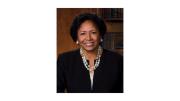In academic terms, the pandemic maintained its sway over campus during the spring semester—particularly in the wintry early weeks. But after the disappointing news of another virtual graduation, in lieu of a full Commencement, spring brought upbeat news about a more normal 2021-2022.
To no one’s surprise, the Ivy League canceled spring competition, while granting seniors an extra season of eligibility if they enrolled in a full-time graduate program during the next academic year (for details, see harvardmag.com/covid-spring-ivysportscanceled-21).
Nor was it surprising when the University announced on February 26 that Commencement will again be reduced to a set of online exercises. With more time to plan, though, this year will include a baccalaureate, more class days, House ceremonies for undergraduates, and perhaps other events. Ruth J. Simmons, Ph.D. ’73, LL.D. ’02, president emerita of Smith College and Brown University, now president of Prairie View A&M, an historically black university, will be the guest speaker. And members of the classes of 2020 and 2021 were promised an in-person Commencement celebration in the future. (Read a full report at harvardmag.com/covid-commplans-21.)
As winter grudgingly eased up and daylight lengthened, making it feasible to get together outside again, and rates of COVID-19 infection declined while vaccination accelerated, the campus safety status was raised to “Level 4: Lime” on March 1. This spring thaw meant each resident undergraduate in a room or suite could host another campus resident—up to a total of six people (three resident hosts, three resident guests). Overnight guests remained prohibited, per the single-room-occupancy rule. Students could travel within a 10-mile radius of campus, and outdoor gatherings of up to 10 people were allowed (if eating, the limit was four). It also became possible for groups of up to eight students to reserve some indoor common spaces, and access dining halls for individual, evening study, though dining remained grab-and-go.
Then, on March 22, the University announced that most faculty and staff members working remotely will return to campus as of August 2, assuming further progress in controlling the pandemic. Schools unveiled their own outlooks. Dean Douglas Elmendorf on March 18 advised the Kennedy School, for example, of plans for “returning to campus in late summer if all goes well.” Faculty of Arts and Sciences dean Claudine Gay followed the University news with her own, including full residential College and Graduate School operation this fall. (Read a full report at harvardmag.com/covid-staffreturn-21.)
Even so, the coronavirus will cast its shadow. Pending further details from Gay, expected in late May, a peer institution’s guidance may be helpful. As at Harvard, a significant number of Yale College’s class of 2024 deferred admission a year; they are expected on campus this fall, along with the class of 2025. Yale has already indicated that the atypically large first-year cohort will not live together on the traditional freshman Old Campus, the Daily News reported, but will be distributed among the residential colleges (Houses), with upper-class rooming rearranged accordingly. Yale also expects to deploy more senior professors to handle larger enrollment in introductory and lower-level courses, and to cover upper-level classes and seminars with more postgraduate teaching assistants.
Harvard has advised students who did not enroll during 2020-2021 that they may not receive conventional campus rooms (given the size of the cohort, and possible health-related bed limits), but has not disclosed alternatives. In early March, dean of undergraduate education Amanda Claybaugh told the Faculty of Arts and Sciences that more than four dozen professors had volunteered to experiment with altered teaching spaces and formats this term—to prototype changes that may be required to resume some kinds of in-person instruction. The experiments will inform decisions about teaching large lectures in a hybrid format, with some students present and others remote, and conducting studios, lab sections, and seminars with social distancing—if required by health factors beyond University control.
The challenges may be less daunting than in 2020, but the evolving new normal will not simply be a return to the status quo ante.









